The Last Laugh

Why does the chareidi street love Bardak (which in Hebrew slang means chaos or turmoil), even as their very world is being lampooned?
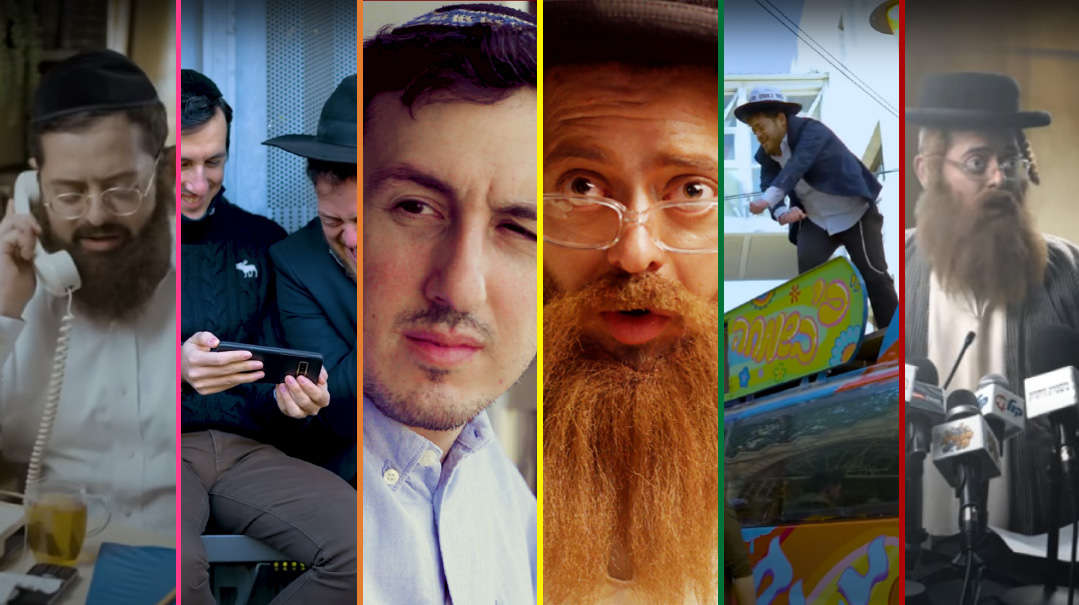
Photos: Elchanan Kotler, Bardak archives
The gravelly voiced Yerushalmi protest organizer and wheeler-dealer Eisenbach is carefully counting his wad of cash as he loads up a minibus of paid demonstrators off to their next location, threatening “Gevalt!” “Milchumeh!” and “Tustus lo yaavor (even a moped won’t get past us)!” But no disgruntled citizens or action-seeking bochurim are actually following this fresh icon of the Israeli chareidi world to the Kikar Shabbos or Rechov Bar Ilan intersections for the latest anti-government demonstration or violent clash with the police.
They can’t — because the ginger-bearded, zebra-clad fellow with the unfiltered Time cigarette dangling from his mouth and the arthritic hip is actually the fictional invention of two young men out to make people laugh. As creators of the wildly popular Bardak comedy clips, Efi Skakovsky and Meni Vakshtok have produced a lovable cast of characters reflecting the quirks of chareidi society and its interactions with the bigger cross-section of Israel today.
There’s Mr. Goldblum (played by Meni) — the American gvir with three factories in Detroit who’s eager to support any yeshivah that will accept his son. Then there’s Efi in multiple roles: as litvish avreich Reb Duvid, as a self-important rosh kollel with a frock and Homburg hat, as a yeshivah administrator with a forehead-covering helmet-sized yarmulke, and of course, as Eisenbach, the funny and flawed kanoi who takes the easy way out when his passionate ideals get a little too impractical.
But it’s mostly fun and very little judgment, even as Eisenbach leads his men onto the light rail to transport them to a demonstration against the light rail, incites a riot so that he can dump his garbage since the night before he torched his own building’s dumpster, and volunteers his services to Putin and Zelensky for a peace summit in the Zupnik mikveh, offering all of his secret weapons — including 200 trays of eggs, a sack of rotten tomatoes, a ton of dirty diapers, a container of marbles to slip up the tanks, and a support team shouting “Utzu Eitzah.”
Efi and Meni hit the ground running when their first video clip (Eisenbach Part I) came out in the fall of 2020. Since then, they’ve masterminded over 50 clips with nearly 16 million views online (and the actual number is nearly doubled, between social media sites, their own email base and dozens of their WhatsApp groups and thousands of private groups), as they address many of the current tensions between sectors with a fresh, funny, unashamed directness. They are unabashed and incisive, expertly digging down to the egos, vulnerabilities and inconsistencies in the characters and demographics they represent, sparing almost no one as they slaughter many societal sacred cows.
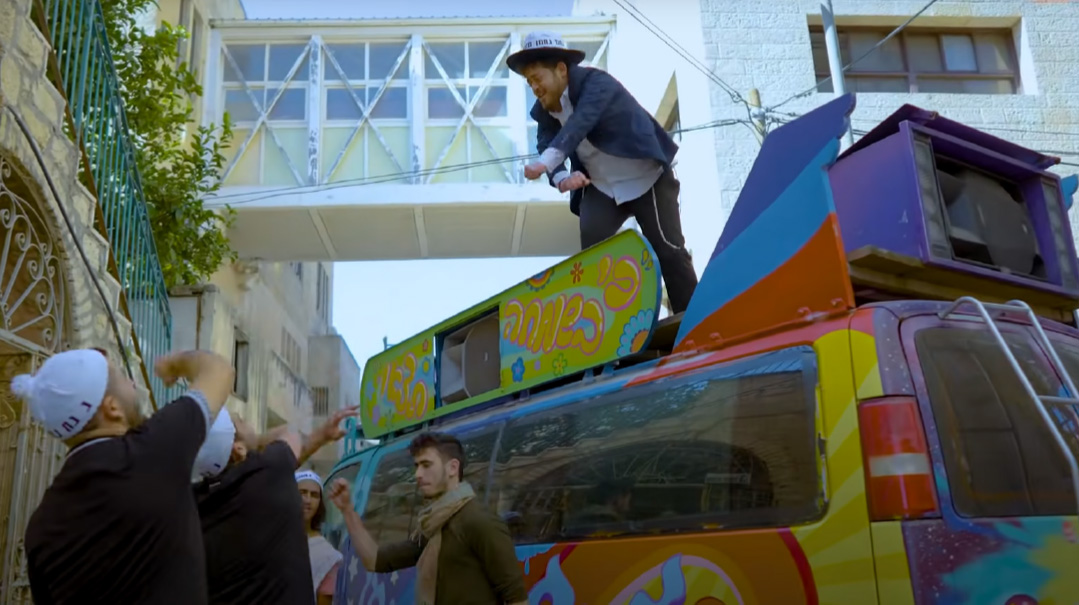
So why does the chareidi street love Bardak (which in Hebrew slang means chaos or turmoil), even as their very world is being lampooned?
Maybe it’s because while the team is funny, they’re not mean, angry, agenda-driven, or attempting any kind of social engineering. It’s very easy for comedy to cross those red lines, especially comedy that is also social commentary, but the Bardak duo doesn’t go there.
Most of all, you can sense that these guys are having a great time creating their clips, transferring our society’s secret language of religious nuances and communal conventions to the medium of the screen. They might make fun of the yeshivah setup and the “let’s look shtark when the donor comes” frenzy (frantically getting everyone out of bed and into the beis medrash, and quickly sticking up the donor’s plaque with Scotch tape), but there are no nasty or bitter undertones in their clips. Because after all, it’s their world too.
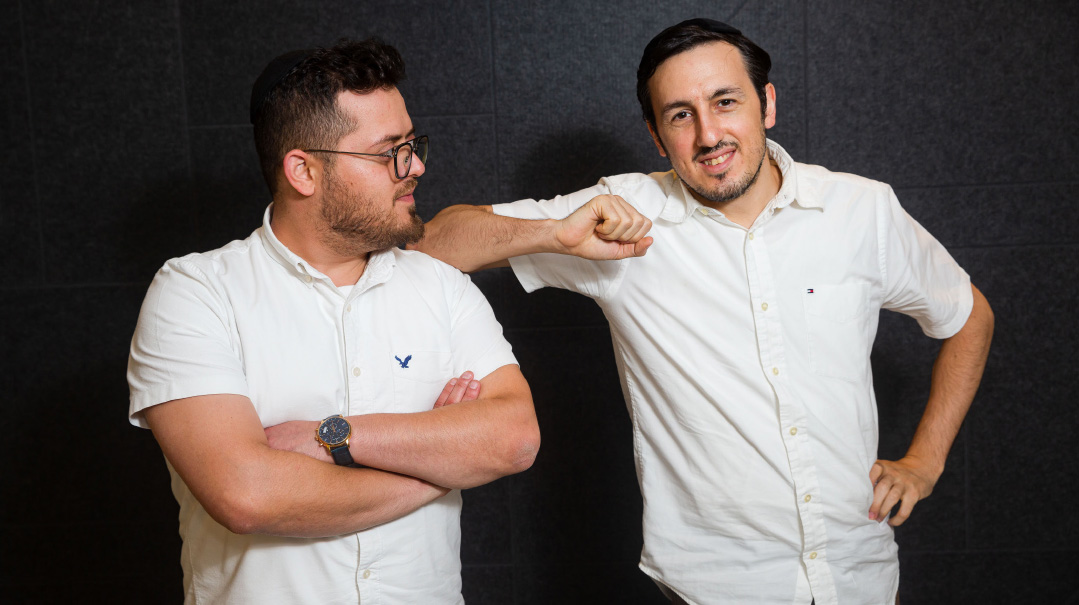
Efi Skakovsky (L) and Meni Vakshtok have created a loveable cast of characters reflecting the quirks of chareidi society, but they have no social agenda – they’re just two young fellows out to make people laugh, even at themselves
Serious Stuff
Just like, as the vintage advertisement went, you don’t have to be Jewish to love Levy’s rye bread, you don’t have to be chareidi to love Bardak. The clips are viewed and loved by followers of all stripes and types. While there are a lot of funny people out there, how did two talented unknowns become, practically overnight, one of the most popular comedy teams in the country, even outside the chareidi sector?
“I would say that we came at the right time and filled a void, and even if the secular world doesn’t get all the nuances, it’s still a lot of fun for them, and a window into a world they only know from a slanted media. But the bottom line is that it was clear siyata d’Shmaya,” says 33-year-old Meni Vakshtok, a graduate of Yeshivas Knesses Hagedolah in Kiryat Sefer who later earned a degree in advertising and marketing and studied at a religious film school in Yad Binyamin (today he’s a member of the staff).
With a decade of media experience, Meni, who lives in Bnei Brak with his wife Yafi (a lawyer) and family, produces, stages, directs and edits the videos that star his creative partner and front man, 28-year-old Efi Skakovsky.
Efi, a graduate of Yeshivas Rashi, an open-style yeshivah within the parameters of the chareidi mainstream, was always the yeshivah entertainer, with a gift for mimicry and satire that kept his friends laughing.
“I always knew that one day I’d do something in the chareidi entertainment world, although I had no idea what it would be,” says Efi, who grew up in Jerusalem’s Ramot neighborhood and now lives in Telz Stone. “I even told that to my wife before we got married. She just laughed.”
But soon enough Efi had the last laugh. In the summer of 2020, right after Efi and Tova’s wedding, he was looking for parnassah options and met Meni. They were both sharp observers of societal nuances and naturally talented performers, and they immediately clicked. The timing was just right, too — it was the height of the second COVID wave and people, stuck at home, were thirsting for entertainment. Plus, many had brought computers and filtered internet into their homes for work or study purposes.
“Efi told me that he had a ton of material for comic sketches, and I also had some, so we pooled our resources,” says Meni, “but then we needed a name. At first we thought of using ‘Tzimmes,’ and we’d even created a logo for it, until we heard that there’s a video company with the same name and we didn’t need any legal hassles. We kicked around another few ideas, and then my wife came up with ‘Bardak.’ It was great — short and catchy — and we went with it.
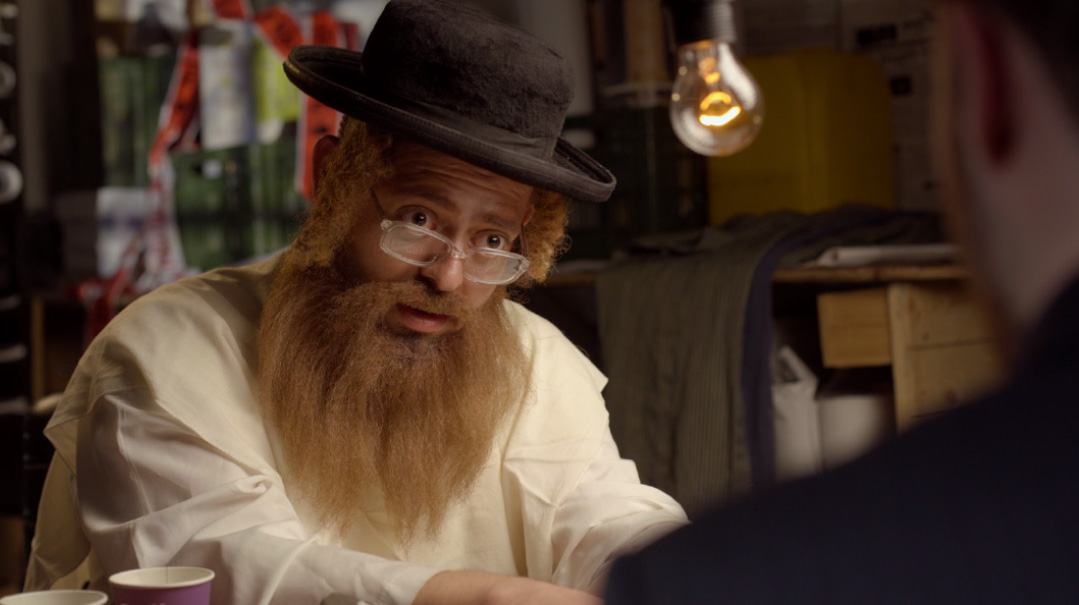
“Right away, we produced our first sketch — Eisenbach on the van,” Meni continues, “yet at the outset we laid down some basic rules. We’re making funny videos, high-quality clips to make people laugh and have a good time while capturing the nuances of chareidi life. But even if there’s some sort of ironic or subtle message, we’re going to be careful about our red lines: not getting swept into agendas, not being mean, and safeguarding the kavod and reputations of real people.
“We also know that our characters have become role models for kids, and we take that seriously. For example, we were debating whether Eisenbach should be chain-smoking and counting his cash. It’s not a great example for kids to see this guy with a perpetual cigarette in his mouth, but we realized that we couldn’t drop it and still keep things authentic. A ‘Tshalmer’ [old-time Yerushalmi] without a cigarette would be like a policeman without a uniform.”
By the way, although many viewers assume that Meni (short for Avraham Menachem Mendel) was born in America — or at the very least has American parents — because of his flawless American accent as Mr. Goldblum, he’s actually as Israeli as they come.
“I still have a little problem with the letter ‘R,’ though,” he admits, “so when I write the scripts, I try not to use any ‘R’ words. If I’d have to say ‘rock and roll,’ I’d be toast.”
Efi and Meni will take a good-natured jab at everything, from a shidduch date with a woman whose face is shrouded by a burka (“So, I was wondering… how do you drink, with a snorkel?”) to the farfrumter yungerman who pretends he’s reading the wall posters so no one will notice that he’s actually davening Minchah at an outdoor minyan of kippah serugah-wearing mizrachistim.
While the final product looks effortless, Efi and Meni can spend weeks writing a script and fine-tuning what in the end will be a two-minute clip, which takes a full day to shoot.
“People always ask us if they can come watch the shoots — they think it will be funny, that they’ll be cracking up,” says Efi. “But the truth is that everyone is working very hard. The director, the soundman, the gaffer, the mix engineer, the cameramen. So yes, it comes out funny in the end, but when we’re working, it really is pretty serious stuff.”
Today they use professional makeup artists and theater props, “but the first time I did Eisenbach,” Efi remembers, “I went into a Purim shop and bought beard glue. It ended up being a traumatic experience — the fumes of the glue made me dizzy and nauseous, and at the end of the shoot, I couldn’t get the beard off.”

Eisenbach might be a kanoi for modesty, Shabbos, or the light rail, but he’s generous enough to lend his tactics to a peace summit between Putin and Zelensky in the Zupnik mikveh
Growing Pains
With over 520,000 views online (besides the thousands of views uploaded to social media sites and their own KosherTube channel), “Bidud” [“Covid isolation”] is Bardak’s most popular clip to date. You can watch it a dozen times and still crack up at each scene. Not only because it’s so incredibly funny, but because it’s such a multi-layered social commentary. You can laugh at the slapstick, but it goes much deeper, touching on the “we can laugh at ourselves” nuances of Litvaks, Chabad, Breslov, and personal anxieties.
We’re drawn in as Reb Duvid first does a favor for his Chabad neighbor by manning his tefillin stand, but then refuses to get involved with his Breslov neighbor as he imagines a sting alongside a Na Nach van gyrating with a bunch of long-haired chassidim with a Na Nach yarmulke atop his black hat.
“Well, there was really nothing funny about it in real life, because I split my pants during the morning filming, so I spent the day with my back against the wall,” Efi comments.
The final clip, which takes just three minutes and 40 seconds, was the product of weeks of thought and logistical headaches. “First we planned to do a clip about a Chabadnik in bidud who needed to light a public menorah, but it wasn’t funny enough,” says Meni. “Then we decided on tefillin. And we gave it a twist — how would a Litvak behave if he were manning a tefillin booth? Then we decided to add a Breslover to the story. So now we had the kernel, and the next step was to embellish it.
“You know, some themes are natural fodder for comedy — like the mechiras chometz clip, where it wasn’t hard to come up with the idea of an Arab digging a tunnel under the house and popping up in the chometz pantry. But here, we had to think hard to give it those extra funny touches — like having Efi dance the Litvak Shuffle with the Breslovers jumping all around him. So that was also a very funny, surprise element. This is part of the game when making these clips.”
“Bidud” wasn’t their first sketch — it was actually 16 out of over 50 — but it’s the one that really put them on the map. Still, it involved significant growing pains.
“Even if you have a great script, when you get to the production stage, it can get complicated,” Meni relates. “We needed to find a Breslover who had a Na Nach van that he’d be willing to let us use. But we were still under the radar then, and whoever we contacted wanted to know, ‘Who are you guys?’ (Today, they send out WhatsApp messages and get any props they need in five minutes.) We called everyone we knew, friends of friends, and finally found one fellow who agreed, after we convinced him that this would be a way of spreading simchah.
“We filmed that part in Geula, and the now-famous stairwell where Reb Duvid meets his neighbors was actually in my parents’ building in Har Nof. First of all, the neighbors knew me, and second, the hall was wide, which made filming easier. After we filmed it, it probably became the most popular stairwell in the neighborhood. Everyone wanted to come and see where we filmed. A few days later, my father sees this couple taking pictures — they were so excited, but they kept looking for the ‘Beis Chabad — Lipsker’ nameplate. They were really disappointed to learn it was just a prop.”
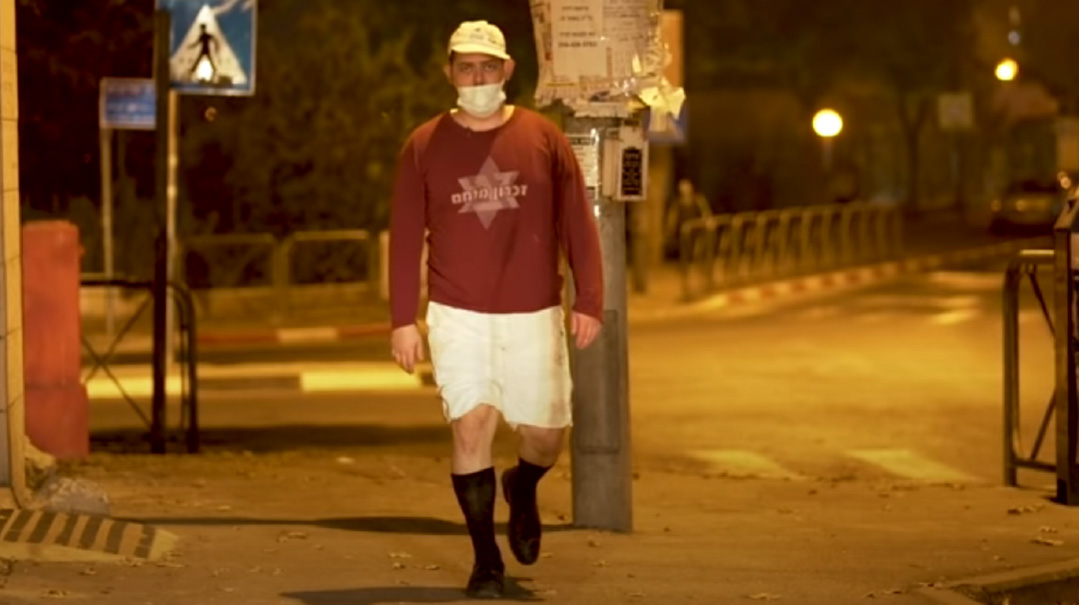
Reb Duvid as a long-suffering Covid volunteer taking on his neighbor’s missions, and in his valiant attempt at appearing chiloni in order to cross the police barrier
While Bardak’s original brand was good-natured pot-shots at chareidi society that make us laugh at ourselves, when their brothers are being unfairly targeted, Meni and Efi become the first line of defense.
“Under Lockdown,” filmed in September 2020 when the chareidi sector was being labeled as “virus-spreaders,” managed to marshal humor while highlighting an unfortunate side of Israeli society. Here is Reb Duvid again, this time being stopped by a police barrier on his way to buy eggs, while an obviously chiloni fellow goes right through. In the next scene, Reb Duvid makes his best effort to dress up as a chiloni himself, determinedly marching to the barrier wearing shorts (but still with his decidedly yeshivish black socks and shoes), a slightly suspicious Elad municipality baseball cap, and the giveaway Zichron Menachem T-shirt with a pen strategically clipped to the neckline.
“Policeman in a Shtreimel” was created in October 2020, several days after police used extreme and disproportionate force to break up minyanim in the Jerusalem suburb of Beitar. One policeman was even caught on camera throwing a bucket at a little boy’s head. In the ensuing Bardak clip, Efi is a police officer practicing hurling buckets at his target — a shtreimel-clad life-size adult mannequin. His supervising officer tells him he has to get his aim better: “In the field,” he says, “the targets are much smaller.”
In another clip entitled “Who is a Chareidi,” Reb Duvid gets angry when a Kupat Cholim official puts the tag “chareidi” on his COVID profile. He then satirizes the argument of so many secular Jews that the chareidim have appropriated the meaning of Judaism, claiming that he’s “a chiloni… a chiloni at heart! Back in Poiland, my grandfather was the biggest chiloni… so who are you to think you have a monopoly on being chiloni?” As he’s storming out, the official asks him, “Okay, if you’re chiloni, name one chiloni singer.” Reb Duvid thinks and finally supplies an answer: “Ishay Ribo.”
It was a funny line, but Meni and Efi were concerned that maybe they’d crossed their own rule of never hurting or making fun of a real person. Perhaps the popular Israeli singer would take it as an insult. And so, they held off the filming for a few hours until they could reach Ribo and ask him permission to use the line. (He graciously agreed.)
Today, Efi Skakovsky walks down the street and heads turn. Everyone recognizes him, and they can’t miss the trademark bulging eyes that so enrich his comic sketches. But what became his satirical signature actually started as a serious medical crisis. When Efi was 21, he contracted Graves’ disease, an immune system disorder that results in several painful symptoms because of an imbalanced thyroid. One of its main manifestations is bulging eyes.
For Efi, though, it was much more than cosmetic. “It put me to bed for a year,” he says. “The pain and suffering were terrible. My eyes bulged and burned, and I sank into a depression.” Later his thyroid was removed, which alleviated the pain, and he continues to take thyroid hormone medication, which keeps his symptoms under control.
Now that those eyes are one of Efi’s props, Meni, as director, tells him when to have them bulge and when to keep them quiet.
“I think my sense of humor and positivity saved me,” Efi says. “And in hindsight, it all worked out for the best — Hashem turned my liability into a blessing.”
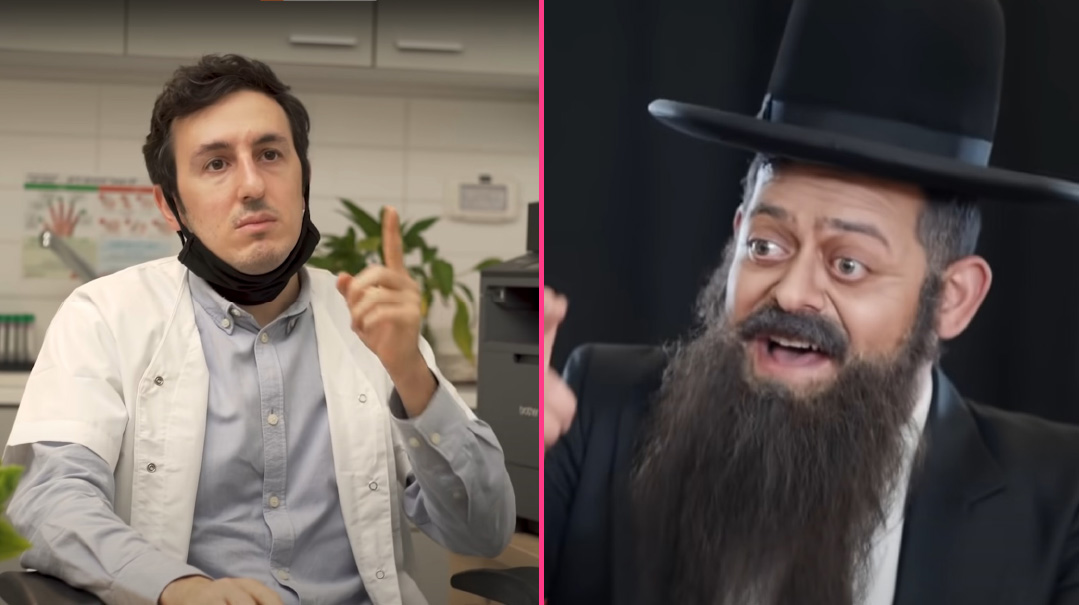
The multiple faces of Efi and Meni. A good-natured jab at our foibles, weaknesses, and social norms
Doing What We Love
The chareidi world today is quite a broad swath, with different approaches to technology. Many yeshivish and chassidish Yidden have never seen Bardak on principle — even though the clips can be viewed on a filtered computer, some people would rather desist. And that’s also okay with the duo. They might be a bit more open-minded, but they understand the principles of different chareidi subgroups.
They even produced their own salute to those differences: a clip called “In the Network,” where Efi is sitting at a bus stop, notices Meni’s smartphone (“We made sure to mention that it was filtered,” Meni notes), and asks for an innocuous favor — could he check a bus schedule for him? Meni happily agrees. Then Efi asks for another favor — could he check his bank account? Meni acquiesces. The requests get more and more intrusive, until finally, Efi spreads out an entire folder of forms and asks Meni if he’d mind photographing and uploading them so that Efi can receive a government stimulus check for his defunct egg sale business.
Today, with Efi and Meni doing videos full-time, releasing a new one every few weeks, almost all their clips are sponsored, “so that we can earn a living doing what we love.”
Some sponsors have a more discreet presence and some less, but Efi and Meni have set one nonnegotiable rule: They’ll never do a sponsored clip that can’t stand on its own comedic merit.
Some of their main advertisers are the Yesh supermarket chain, Kupat Cholim Meuhedet, and Mercantile Bank, which struck gold with a series of clips that turned the bank into a household name and gave it a life of its own. The jealous neighbor (pondering how the guy across the street could afford to expand his porch), the nosy wedding guest (speculating who foot the bill for the lavish affair), and the snooping friend (who is supposed to check on his buddy’s well-appointed house when he’s away and instead snoops into all the closets and corners — until he realizes there’s a surveillance camera on the ceiling) have all become familiar characters who finally realize that all that money can come from a bank that has your back.
“Of course,” says Meni, “we prefer to do the regular clips without having to come on to advertisers, but there’s no money in them. Still, those clips are like our business cards, and the better they are, the better for business all around.”
Bardak’s biggest surprise is its popularity abroad, even among audiences that don’t understand Hebrew. How is it that viewers who’ve never been held up in traffic by a hafganah, who’ve never lived in an Israeli apartment building, or who have no experience with the Israeli police force, can’t stop laughing at the Bardak clips? The question intensifies when you consider that the clips are all in modern Hebrew, without English subtitles to help mitigate the language barriers.
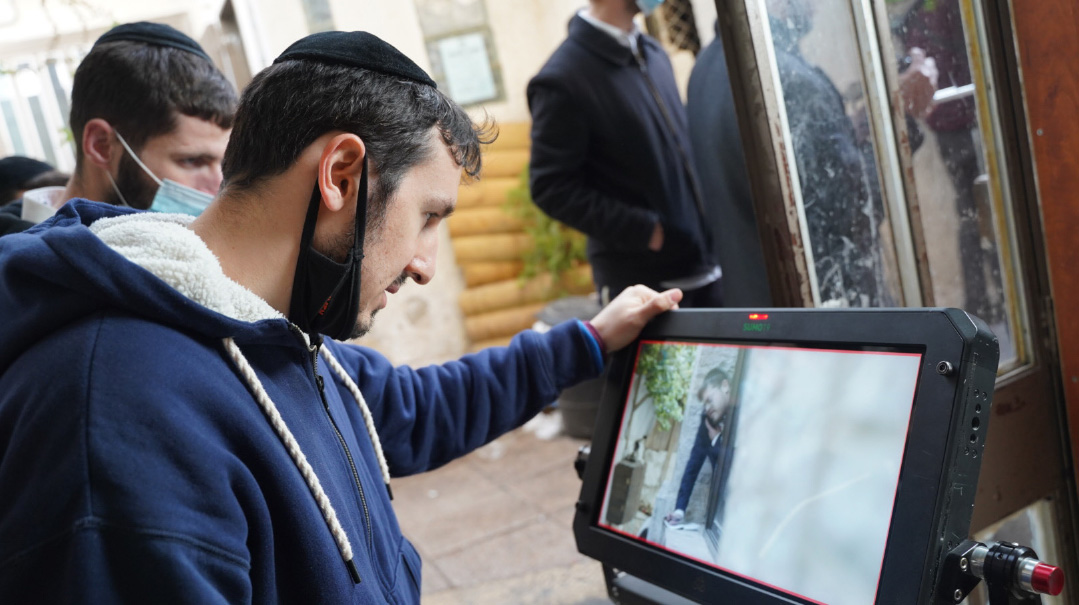
As both actor and producer, Meni straddles both sides of the camera
It’s really not a mystery, at least not to Meni. “That’s because we aren’t speaking Ivrit,” he says. “We’re speaking ‘chareidit.’ Yeshivish. This is about our culture, not our language. The language is just the background. Everyone can figure out chareidit, even if they don’t understand modern Hebrew.”
Which just goes to show how their gift to the klal — providing funny, clean, kosher videos with penetrating humor and multi-level messages — has been accepted.
“Sometimes I think, ‘Why us?’ I’m just a kid from Ramot and Meni grew up in Har Nof, and yet we’ve touched the lives of so many people,” says Efi. “I always knew I would be a funny entertainer, that I’d live life making Yidden laugh. I just never dreamed it would be this huge.”
(Originally featured in Mishpacha, Issue 931)
Oops! We could not locate your form.







